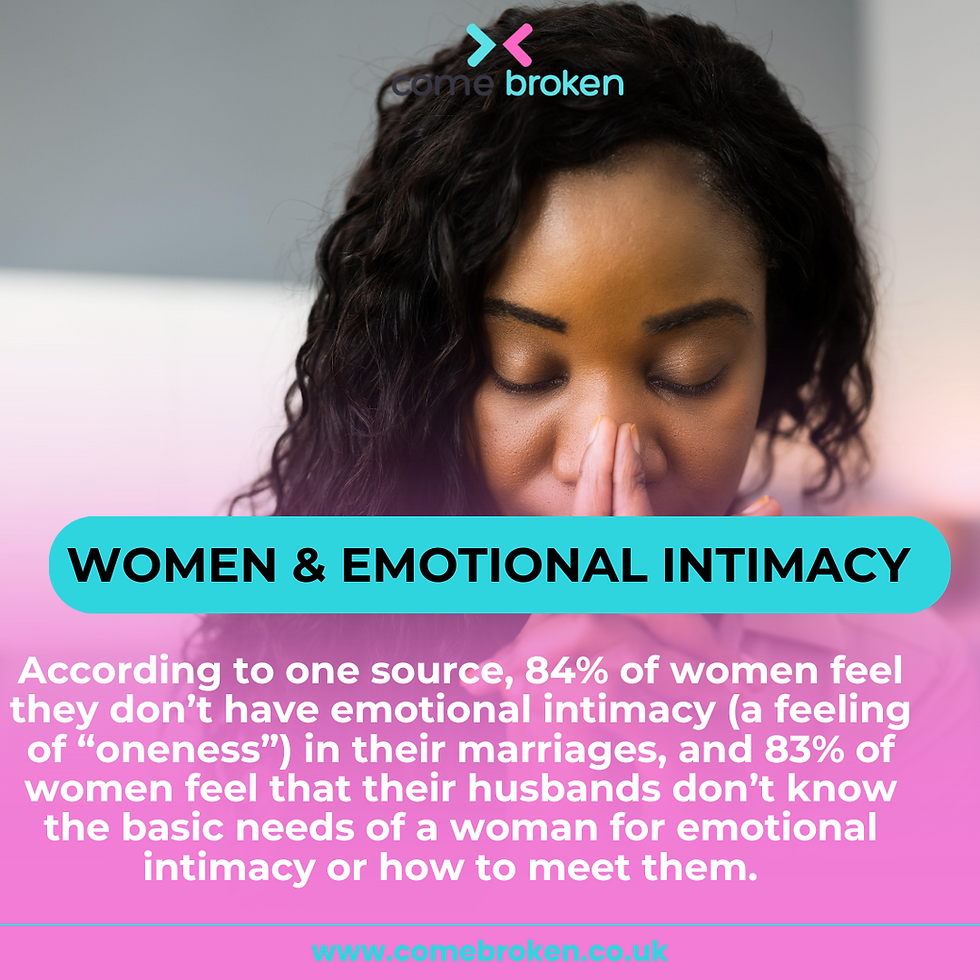Emotional Intimacy & Husbands’ Understanding - Why So Many Wives Feel Alone in Their Closest Relationships
- Wilbert Frank Chaniwa
- Sep 17, 2025
- 4 min read

“To a wife, the emotional intimacy she craves is having her husband be her best friend… someone who loves to talk with her about everything.”
— Barbara Rosberg, Every Woman’s Desire
Marriage is meant to be one of the deepest forms of connection. Yet, alarmingly, a large body of evidence suggests that many women in marriage feel emotionally disconnected. Two powerful statistics:
84% of women feel they don’t have emotional intimacy (oneness) in their marriages.
83% of women feel that their husbands don’t know the basic needs of a woman for emotional intimacy, or how to meet them.
What Do These Statistics Reveal?
They show that it isn’t just about one bad conversation or one rough patch. Many women feel a consistent gap in:
Emotional understanding: feeling heard, understood without needing to explain every time
Availability: having their husband present emotionally—sharing fears, hopes, disappointments
Vulnerability and reciprocity: being able to open up, and trusting that what’s shared is received without judgment or dismissing
Closeness and oneness: not just living together, but feeling like you share a heart (or lives) deeply
When these aren't met, the result is often loneliness in what should be the safest relationship, dissatisfaction, sometimes even emotional distress.
Why The Disconnect Happens
Here are some of the reasons found in our research & relationship counseling practice that help explain the huge gap between what many women feel and what many husbands seem aware of:
1. Different emotional wiring & socialization
From early life, men are often taught to solve, to be strong, to fix, not necessarily to feel or to express vulnerability. Women are often encouraged to talk, to share, to sense emotions. This mismatch sets the stage for misunderstandings. Husband may not even know how to express, or may think their way of showing love suffices.
2. Lack of skills or vocabulary for emotional intimacy
It’s one thing to want closeness, another to know how to build it. Listening well, responding empathetically, asking “How was your day? What’s weighing on your heart?” Those are skills that many aren’t taught. Without them, emotional conversations are rare. Rosberg describes that a wife’s idea of connection is often heart-to-heart talk.
3. Fear of getting it wrong
Some husbands withdraw or stay silent because they worry that if they speak up, they’ll make things worse: saying the wrong thing, being judged, or failing to meet her expectations. Silence feels safer. This inadvertently forces the wife to stop trying or feel misunderstood.
4. Life pressures & distractions
Work, kids, chores, digital distractions, stress—all eat away at capacity for emotional connection. Time becomes scarce, fatigue high, patience low. Intimacy is often one of the first things to suffer. It may not be intentional—but it compounds over time.
5. Unaddressed expectations & miscommunication
Many women expect that emotional connection and understanding should be “natural” or “shouldn’t need to be asked for.” When husbands don’t intuitively pick up on these needs, women may feel disappointed; husbands may feel confused or criticized. Neither side feels understood.
The Consequences
When emotional intimacy is missing or perceived to be missing:
Loneliness in marriage: being physically close but emotionally distant
Decreased sexual and physical connection because emotional closeness often fuels physical intimacy
Resentment builds: feeling unappreciated, unseen, or taken for granted
Increased conflict or withdrawal: conversations may become transactional (kids, logistics, chores) rather than relational
Potential for relationship breakdowns over time if emotional needs stay unmet
What Can Help: Practical Steps
For wives, husbands, or couples wishing to move toward greater emotional connection, these steps have helped many:
1. Open communication & naming what’s missing
Sometimes having a calm, non-blaming conversation about what emotional intimacy means to you. Use “I” statements (e.g. “I feel alone when…”). Help your partner see what you need.
2. Make dedicated time for emotional connection
Even small daily rituals: a check-in at dinner, a few minutes at night to talk without distractions. No phones, no multitasking.
3. Learn empathetic listening
Try to do more than hear words—listen for feelings. Ask follow-up questions. Reflect back: “It sounds like you felt …” rather than solving. Just being present can make a huge difference.
4. Share your heart, encourage his sharing
If women open up first, sometimes it gives husbands permission (or safety) to open up. Vulnerability breeds vulnerability. Make emotional safety a priority: avoid judgment, dismissiveness, criticism.
5. Adjust expectations & celebrate progress
Recognize that learning emotional intimacy is a journey. Celebrate small wins: a meaningful conversation, a moment of closeness. Over time, these build trust and dimension.
6. Seek outside help if needed
If the gap feels too wide, a counselor or therapist trained in relationships can help couples learn communication tools, emotional safety, and rebuild connection.
Even though the statistics are stark, they also reveal something else: that this is a common issue, not a personal failure. Many marriages suffer similar disconnects. This means there are many models, stories, and resources showing it can improve. Emotional intimacy isn’t magic—it’s built gradually, with intention, humility, and consistency.
At Come Broken we believe that being intentional and committed goes a a long way in getting a positive result. For help. guidance and counselling email us on willandefe@comebroken.co.uk

Comments